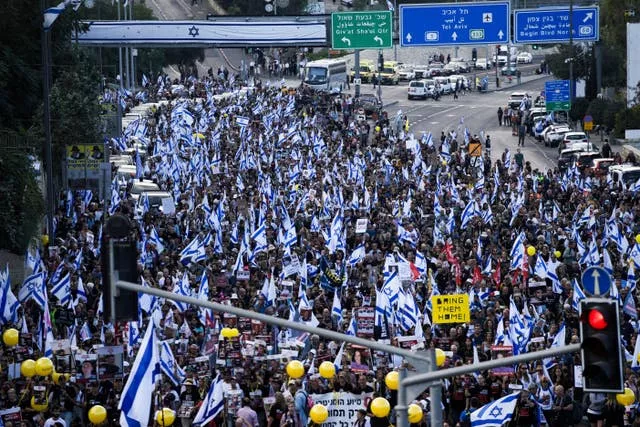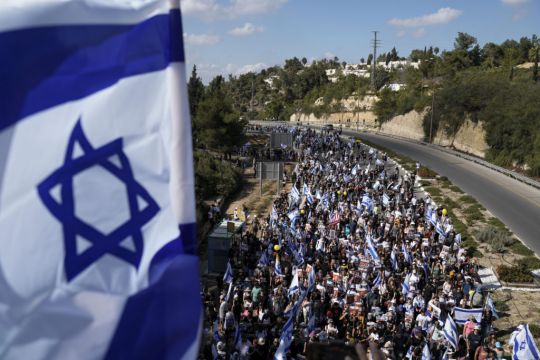Thousands of family members and supporters of some 240 hostages held in Gaza have streamed into Jerusalem, castigating Israeli Prime Minister Benjamin Netanyahu’s government over his management of the war with Hamas and pleading with the government to do whatever it takes to bring their loved ones home.
As public pressure mounted, Mr Netanyahu said on Saturday that Israel’s war cabinet would meet with representatives of the families this week.
“I am marching with you. The Israeli people are marching with you,” he said.
“I promise, when we have something to say, we will inform you.”

The march capped a five-day trek from Tel Aviv and represented the largest protest on behalf of the hostages since they were dragged into Gaza by Hamas on October 7 as part of the militants’ deadly attack in southern Israel.
About 1,200 people were killed in Israel on the day of the surprise Hamas assault.
Israel declared war in response, and more than 11,500 Palestinians have been killed in the past six weeks as the Israeli military conducts a punishing air and ground offensive in Gaza, where Hamas militants have ruled for the past 16 years.
Israeli leaders have set dual objectives – to crush Hamas and to bring the hostages home.
But they have not made clear to families how they plan to balance the two.
Some of the hostage families have said they fear that the military offensive endangers their loved ones.
Israeli leaders, in turn, have argued that only military pressure on Hamas will lead to some hostage releases in a possible deal involving a temporary ceasefire.
The families have not rallied around a single proposal for getting their loved ones back, but pleaded for more empathy and responsiveness from the government.

Some criticised Israel’s war cabinet for what they described as a lack of transparency about any rescue plans.
On Saturday, the marchers carried Israeli flags and photos of the hostages as they finished the 70-kilometre (45-mile) walk to Jerusalem and slowly converged on Mr Netanyahu’s office.
Once there, they were joined by crowds carrying yellow balloons printed with the words “Bring them home.”
“I want you to look in my eyes and try to understand just a bit of the trauma I’m feeling,” Daria Gonen, referring to Israeli leaders, said at the rally.
Her 23-year-old sister, Romi Gonen, was kidnapped by Hamas from a music festival-turned-massacre near Gaza.
Ruby Chen, another protester, said that the families want to “keep the awareness of the hostage issue as a top priority for the government of Israel”.
Ms Chen’s 19-year-old son is a hostage.
For the families, the procession marked the culmination of six weeks of worrying and wondering about the safety and whereabouts of their relatives, who include children and older adults.

At a plaza in front of the Defence Ministry in Tel Aviv, protesters released hundreds of pink balloons into the air and set out trays of cake and biscuits, celebrating the birthdays of two hostages held by Hamas, nine-year-old Emily Hand and 57-year-old Raz Ben Ami.
The march came as Israeli media reported that the war cabinet was considering a Qatari-brokered deal to win the release of the women and children among the hostages.
In exchange, Israel would agree to a ceasefire of several days and release several dozen of the thousands of Palestinian prisoners it is holding.
Mr Netanyahu denied on Saturday that a deal had been struck.
“On the issue of hostages, there are a lot of unsubstantiated rumours, a lot of incorrect reports. I want to clarify, until this moment, there has not been a deal,” he said.
Of the more than 240 hostages kidnapped to Gaza, five have been released – four of them through international diplomacy involving Qatar, and one who was rescued by Israeli troops.
Their freedom raised the hopes of other families.
But Israel this week confirmed the deaths of two hostages, and Hamas and Islamic Jihad have published several videos of hostages who looked unwell, provoking fear and concern among many.







